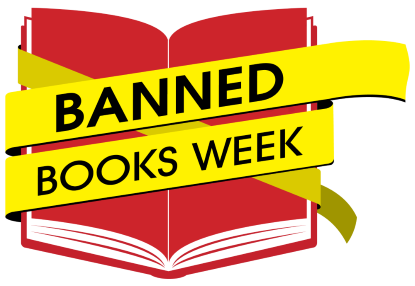While Banned Books Week has been recognized in the U.S. every fall since 1982, the history of banning texts is much, much longer and, and it spans far beyond the borders of this country. The Catholic Church maintained the Index Librorum Prohibitorum (Index of Forbidden Books) for hundreds of years, as authors and intellectuals like Voltaire, Simone de Beauvoir, and Copernicus were, at one time or another, included in the list. National governments often got in on the act as well, though book banning on the national level (or by major religions for that matter) is now a rare occurrence.
More common today is the attempt to ban books (or at the very least challenge them) at the state or local level, as parents or those who wield power often want to remove texts from libraries and classrooms for myriad, often deeply personal, reasons.
In an effort to stand with all libraries that are targets of such censorship efforts,
and to support intellectual and invidivual rights here on UHD's campus, the W.I. Dykes library will display a table of books that have been or are challenged or banned. Make sure
you stop by the display at the 5th floor entrance and take a moment to see some books
have come under fire. You might be surprised.
rights here on UHD's campus, the W.I. Dykes library will display a table of books that have been or are challenged or banned. Make sure
you stop by the display at the 5th floor entrance and take a moment to see some books
have come under fire. You might be surprised.
It should also be noted that, today, especially in Texas, the most commonly banned or challenged books contain LGBTQIA+ content, are claimed to be sexually explicit, or contain depictions of drug use. And it isn't just what might be considered a "conventional book." Comics, graphic novels, even children's books are also challenged frequently for a multitude of reasons. Too often, such texts are opposed for reasons that have more to do with a small group's personal belief system than anything else.
With this in mind, we must remember: Most censorship is at worst harmful, and at best an infringement on rights to free expression (the censoring of expressions that are threatening, intend to incite violence, or defamatory is good, for example).
As author and educator Jim Trelease writes, “Although everyone should have the right to protest in a free society, that right has limitations....” No one person or group should be able to prevent another from reading a book, in other words.
But Banned Books Week has a subtext, if you will, and provides another lesson: books, and the ideas therein, still hold power, even in our technocratic age (and no, I don't practice bibliomancy).
The very act of challenging or banning a book is a tacit acknowledgement of that text's power, and the persistence and potential persuasiveness of its ideas—the power to inform a populace, spread revolutionary or unpopular ideas, and to help citizens make their own decisions.
So check out a banned book, and on September 28, (Martina McBride voice) Let Freedom Read!

